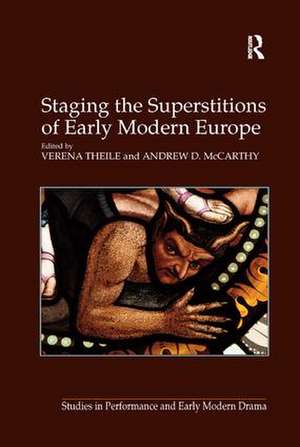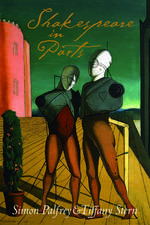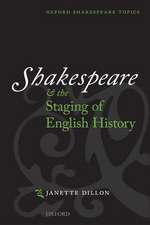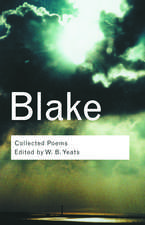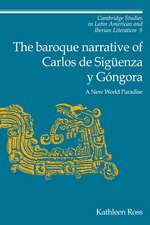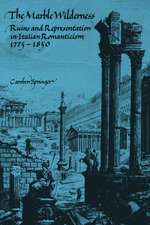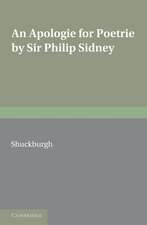Staging the Superstitions of Early Modern Europe
Autor Andrew D. McCarthy Editat de Verena Theileen Limba Engleză Paperback – 15 noi 2016
| Toate formatele și edițiile | Preț | Express |
|---|---|---|
| Paperback (1) | 469.34 lei 6-8 săpt. | |
| Taylor & Francis – 15 noi 2016 | 469.34 lei 6-8 săpt. | |
| Hardback (1) | 1060.25 lei 6-8 săpt. | |
| Taylor & Francis – 22 feb 2013 | 1060.25 lei 6-8 săpt. |
Preț: 469.34 lei
Nou
Puncte Express: 704
Preț estimativ în valută:
89.81€ • 94.00$ • 74.75£
89.81€ • 94.00$ • 74.75£
Carte tipărită la comandă
Livrare economică 31 martie-14 aprilie
Preluare comenzi: 021 569.72.76
Specificații
ISBN-13: 9781138261716
ISBN-10: 1138261718
Pagini: 312
Dimensiuni: 156 x 234 x 17 mm
Greutate: 0.45 kg
Ediția:1
Editura: Taylor & Francis
Colecția Routledge
Locul publicării:Oxford, United Kingdom
ISBN-10: 1138261718
Pagini: 312
Dimensiuni: 156 x 234 x 17 mm
Greutate: 0.45 kg
Ediția:1
Editura: Taylor & Francis
Colecția Routledge
Locul publicării:Oxford, United Kingdom
Notă biografică
Verena Theile is Assistant Professor of Early Modern Literature at North Dakota State University, USA. Andrew D. McCarthy is Assistant Professor of Early Modern Literature at the University of Tennessee-Chattanooga, USA.
Recenzii
'This illuminating collection brings together chapters on literature and history to explore how superstition permeated early modern society. A lively new must-have for all those interested in witchcraft, demonology and magic.' Marion Gibson, University of Exeter, UK 'The quality of the scholarship here is high... ten fascinating essays, which between them offer reflections on a broad range of subjects (including, but not limited to, early modern religious debates and the Reformation; the language of rhetoric; gender relations; sexuality; political affairs; violence and crime; and mind and memory)... the book is a clear success.' Journal of the Northern Renaissance ’...the collection offers a wide variety of informative and suggestive approaches to the topics it treats. ... gives its readers a heightened understanding of why magic, and superstition in general, had such a hold on many early modern citizens, while simultaneously showing how sceptical others may have been about its efficacy as a route to power or as a means of holding back the terrors of the night.’ Early Theatre 'Staging the Superstitions of Early Modern Europe provides a deep well of ideas into which the reader may dip at will. ... a useful resource for institutional libraries and scholars of early modern superstitions ...' Appositions
Cuprins
Foreword: Something of the Night Introduction: Superstitions, Literature, History, and the Creative Imagination Part 1 Early Modern Superstitions: Religion, Reformation, and the History of Fear 1 Popular Magic, Witchcraft, and Lutheran Religious Literature 2 “Let not Phantasies Misgouerne You”: Entertainment as Religious Polemic (The Case of Barnabe Riche) 3 Early Modern Literary Engagements with Fear, Witchcraft, the Devil, and that Damned Dr. Faustus Part 2 Witchcraft on Trial 4 The Supernatural on the Stage: An Analysis of Early Modern Literary and Theatrical Representations of Lancashire’s Witches and Demons 5 Vision on Trial in The Late Lancashire Witches 6 The Joint-Stool on the Early Modern Stage: Witches, Wives, and Murderers in Macbeth and Arden of Faversham vi Staging the Superstitions of Early Modern Europe 7 The Medicalization of “Midnight Hags”: Perverting Post-Menopausal and Political Motherhood in Macbeth Part 3 Stage Dissections 8 “Such a Sinner of His Memory”: Prospero, Bruno, and the Failures of Neo-Platonic Memory Magic 9 Prophecies, Dreams, and the Plays of John Lyly 10 Travelers’ Tales: Magic and Superstition on Early Modern European and London Stages
Descriere
Engaging with fiction and history- and reading both genres as texts permeated with early modern anxieties, desires and apprehensions- this collection scrutinizes the historical intersection of early modern European superstitions and English stage literature. By highlighting the connection between historical-literary and literary-dramatic culture, this volume tests and explores the current scholarly theory that performance opened the way to disbelief.
